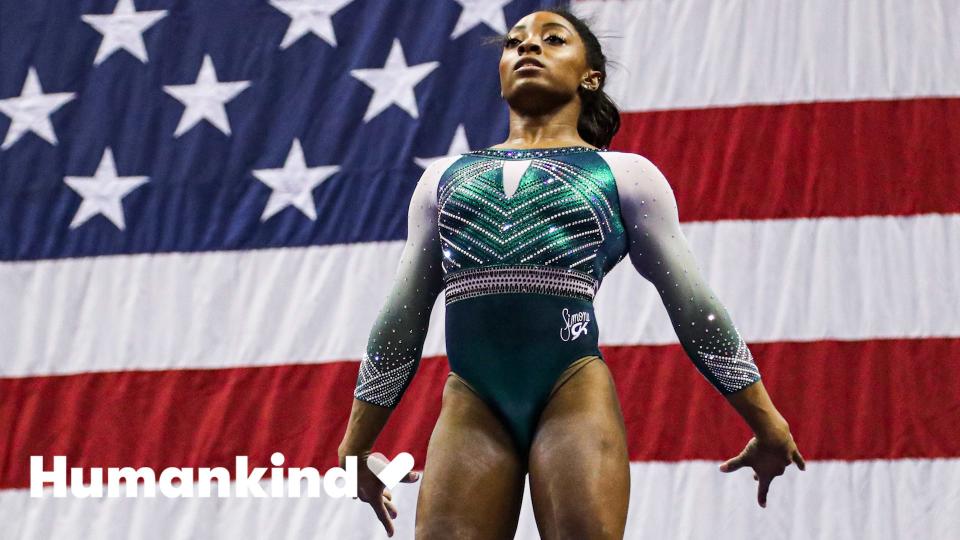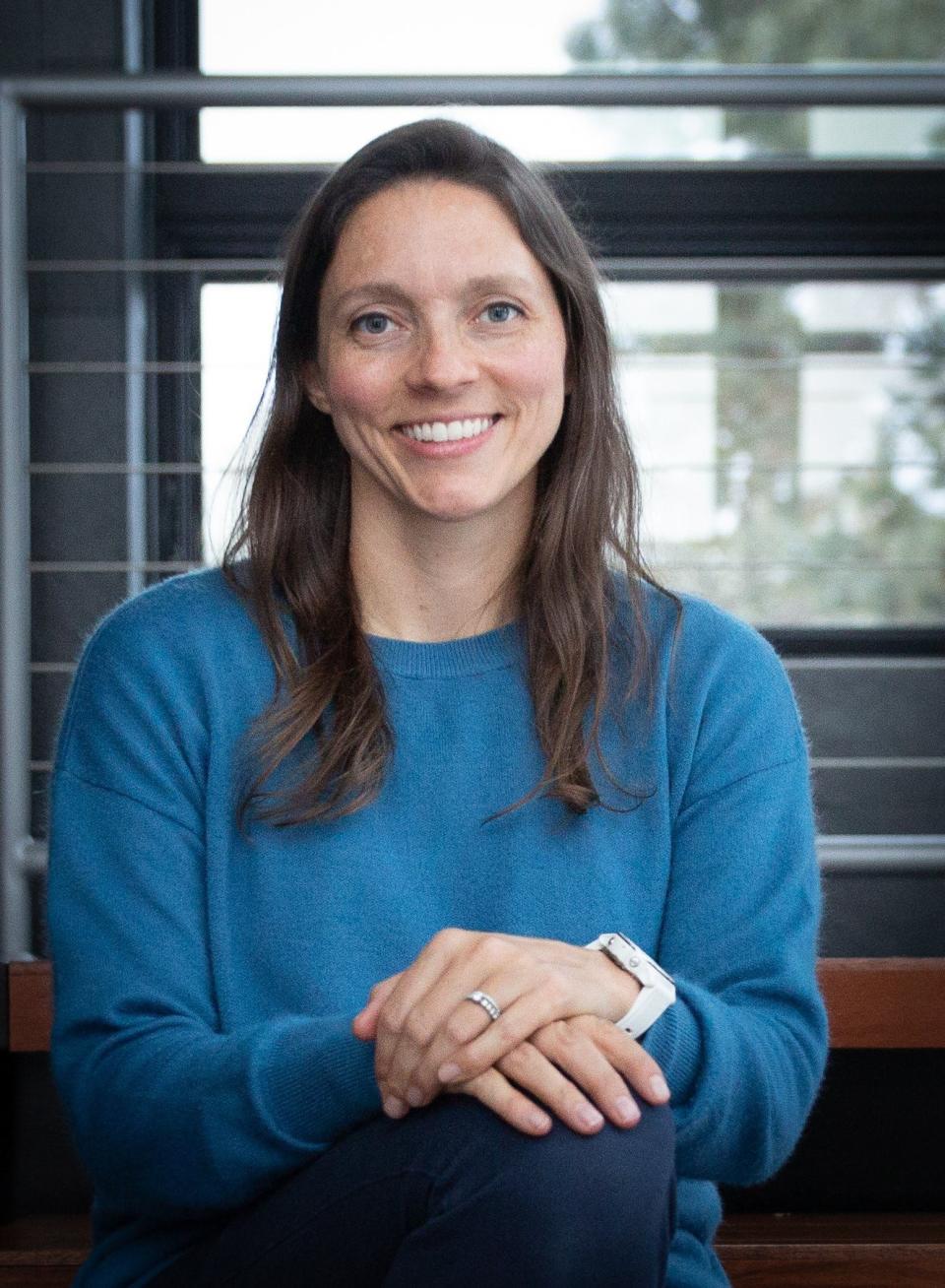Silver medal: Simone Biles lived, suffered then flourished under the Olympic microscope
Americans learned a new term this week: “The twisties.” More importantly, a new word has entered the lexicon of elite gymnasts in our country: “No.”
We expected to be shocked and amazed by the athletic performance of Simone Biles this week, and indeed we were. We expected her to rewrite the history books, and indeed she has. She has done this not by doubling her collection of five Olympic medals, but perhaps in a more profound, inspiring, and necessary way than any of us anticipated.
To understand this, we need context.
Five years ago, the United States women won team gold, and Simone Biles became a household name. That same week, media reports emerged about longstanding sexual abuse within USA Gymnastics. Since then, the staggering breadth, severity, and frequency of that abuse – and the complicity of USA Gymnastics (USAG) leadership – has been exposed. Some of this wrongdoing has been punished. Much of it has not yet been. But “the system” that allowed this, perpetuated this and directly caused this needed to change.
Change at USA Gymnastics
Tom Forster was hired in 2018 as the new national team coordinator. A culture of fear has gradually evolved into a less intimidating one, where Forster aims to promote openness and mutual respect. Many elite gymnasts have acknowledged the progress.
USA TODAY's Suzette Hackney: Simone Biles is a role model for prioritizing her own mental health over an Olympic medal
But Forster’s leadership has been imperfect. The transparency he promised has not always been delivered. When asked to explain his rationale for controversial World and Olympic Team selection strategies, his answers could be dismissive or even disrespectful. Additionally, Simone herself posited this month that perhaps the pendulum has swung too far in this new era, with coaches wary of how assertive they are allowed to be. There is substantial room for improvement.

At 24, Simone has been labeled the greatest of all time, broken records galore, and is rewriting the gymnastics Code of Points.
But along with the accolades, her stressors add up quickly:
► Surviving sexual abuse by the team doctor;
► Competing for the organization whose leadership is charged with destroying incriminating evidence in the abuse cases;
► Languishing in legal gridlock between sexual assault survivors and bankrupt USAG;
► Feeling compelled to continue her gymnastics career to ensure that USAG is ultimately held accountable for its complicity in the sexual abuse;
► Real physical pain from nearly two decades in this merciless sport;
► Real physical exhaustion from a grueling Olympic training regimen;
► Real physical danger due to the intricacy and complexity of her particular skills;
► Amplified pressure because Forster’s strategy for Olympic gold relies disproportionately on her;
► Simone’s own self-imposed goals and expectations;
► Separation from her family because of the pandemic, which complicates literally everything; and
► Five arduous years for this Olympic cycle.
A very stressful life indeed, under the Olympic microscope, really hoping you can earn the gold medal that’s long been considered a foregone conclusion.

Dangerous sport, deadly stakes
The U.S. women’s gymnastics team won a silver medal in Tokyo on Tuesday, despite Biles withdrawing after her mishap on vault. Though she typically makes it look easy, the Amanar is an incredibly difficult skill, and she became disoriented in mid-air. When I saw this happen, I shrieked, because I knew all too well the implications for the remainder of the competition.
Discrimination in Japan: The biggest loser at the Olympics? Japanese racism
When a gymnast gets the twisties, mid-flight spacial awareness is absent, discernment of up versus down is impossible, the brain feels disconnected from the limbs, and any memory of how to properly complete the skill abruptly and comprehensively disappears. If you don’t know where you are in your twist, then you have no idea when or how you will hit the ground. If you don’t know how to prepare for the landing, it can hurt you – very badly.
It usually stems from stress. But after it happens once, it is very difficult to just “go back to normal.” It feels like neural pathways need to be rewired. Sometimes it takes weeks, or even months. I should know.

My old teammates remember this day in training better than I do. I was learning whip-two-and-a-halfs on floor. At almost 15, I had competed two-and-a-half twists for a year, but the whip (like a back handspring but with no hands) into it was new. I remember struggling with the timing and the angle of takeoff, and I remember being frustrated, tired, and scared. I had already done nine of them, which was double the normal amount. I couldn’t wait to be told I was done.
The next thing I remember, my coach was spoon-feeding me Jell-O.
It took me quite a while to orient myself, but I finally concluded that I was in a hospital. Tubes and wires; monitors; my coach feeding me by spoon. I recall very little of my time in the ICU, but the medications to reduce intracranial pressure in my skull were successful, and I was discharged home when the brain swelling had subsided.
Opinions in your inbox: Get the best insights and analysis delivered to your inbox
My story has a happy ending. I eventually returned to the gym and had a successful season, but it took months to regain my confidence on twisting skills. I simply didn’t trust my body to know where it was in the air. I’m told that on that fateful day, instead of one flip and two-and-a-half twists to my feet, I had done two twists and over-rotated the flip to land flat on my back, completely missing my feet on the floor.
Years later in medical school, when I sat through lectures on traumatic brain injury, I realized how lucky I was to be alive. In pediatric residency, as I cared for a 14-year-old girl dying from brain herniation, I again saw my own good outcome had not been a guarantee.
Armchair Olympians
Simone was lost in the air. In a slow-motion replay you can see that by the end of the first twist, her head is neutrally aligned, and in the next half twist, her head is toward the right. Your head should never be to the right if you are twisting left. She was completely disoriented.

Miraculously, she landed on her feet in a deep squat, and stood up, physically unscathed. She saluted the judges, walked off the mat, and looked stunned.
Before long, broadcasters told us that Simone had withdrawn from the rest of the competition. Later, USAG announced her withdrawal from the Women’s All-Around Final, and her plans for four Event Finals Aug. 1-3 are yet to be decided.
Since this all transpired, Simone has received predominantly heartwarming support. But plenty of condescending armchair Olympians and contemptuous media personalities have said she’s a quitter. That she’s too weak to handle the pressure. And even that she’s hiding behind the “excuse” of mental illness.
I'll tell you one excellent thing about the new gymnastics regime in the United States. Simone had autonomy. She said she was not safe to compete – mentally – and therefore physically. Those two are inextricably intertwined.
Her coaches listened and they supported her. And we should too.
Who knows what would have happened if Simone had competed the rest of the meet on Tuesday. My experience shows that losing kinesthetic awareness mid-air is life-threatening. Her brain and spinal cord were genuinely at risk.
Teammates rise to the occasion
In my eyes, the women’s Team Final in gymnastics was a victory. Simone had the privilege of thinking, feeling, and deciding. Her teammates had the privilege of rising to the occasion on the biggest of stages, under the brightest of lights.
Jordan Chiles, who was not slated to compete on bars or beam, stepped in and nailed those routines when it mattered. Grace McCallum hit eight for eight routines in the Olympics. Sunisa Lee crushed the world's hardest bar routine when the pressure was massive. And she excelled in Simone’s spot on floor exercise despite having only 30 seconds to warm up for her routine. All four women now have a silver medal as a reward for their tenacity, courage and grit.
Let athletes cover up: Tokyo Olympics are not a bikini showcase. Let women athletes wear unitards, and hijabs.
Take advantage of the privilege of watching this young woman's life unfold. Simone is tremendous when she soars, and she's tremendous when she speaks. Every day until this past Tuesday, she's shown us that she can. On that momentous day, she told us that she can't, and I respect her all the more. That’s not weakness; that’s wisdom.
I hope Simone feels empowered, admired and loved. I hope she feels confident in her gymnastics and her decision-making. I hope she leaves Tokyo with heaps of perspective and no regrets.
And I hope she forever cherishes what that Olympic silver medal means for her, her teammates, the gymnastics community and for anybody who has ever felt that the external pressure to “carry on” is too great to survive. Sometimes “no” is the most powerful word we possess. Simone is a champion who reminds us that we don’t need medals to quantify our greatness or measure our success.
Hannah Renno is a pediatrician and mother of four, now specializing in breastfeeding medicine while homeschooling her children. She was a competitive gymnast for 14 years, including four years in the NCAA representing the University of Arkansas.
You can read diverse opinions from our Board of Contributors and other writers on the Opinion front page, on Twitter @usatodayopinion and in our daily Opinion newsletter. To respond to a column, submit a comment to letters@usatoday.com.
This article originally appeared on USA TODAY: Olympic silver medal: Gymnastics is better because of Simone Biles

